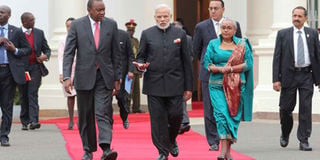Tap goodwill behind visits, meetings

Front, from left to right: President Uhuru Kenyatta, India's Prime minister Narendra Modi, and First Lady Margaret Kenyatta at State House in Nairobi on July 11, 2016. PHOTO | JOAN PERERUAN | NATION MEDIA GROUP
What you need to know:
Visitor’s footfalls heal the sick.
If Kenya, the patient, is not healed, there can be only one explanation—the patient is spitting out the medicine.
If the patient wants to get well, they must swallow the medicine.
We must accept the grace of so many chances offered and follow through to make this nation great.
This demands leadership.
"Visitors' footfalls are like medicine; they heal the sick,” according to an African proverb.
This being the case, Kenya has had a good dose of medicine, having had such a rich influx of visitors in recent times. Whether our somewhat sick country has benefited from the medicine is a matter for further examination.
The visit that caused the biggest buzz is probably that of US President Barack Obama, in July 2015.
The visit, the first by a sitting US President, was both personal and political. Not long after, in November, we had the honour of hosting Pope Francis, the second Pope to visit Kenya, since Pope John Paul II’s in 1995.
In May, this year, South Korea’s President Park Geun-hye visited with a delegation of more than 200 businessmen and government officials. Significantly, this was the first visit by a Korean head of state in 34 years, the last being in 1982 by former President Chun Doo-Hwan. Before President Park departed, Turkish President Recep Tayyip Erdogan landed in Kenya for a three-day visit. He too arrived with a delegation of Turkish businessmen.
In recent days, we have also hosted Israeli Prime Minister Benjamin Netanyahu and his Indian counterpart Narendra Modi, who signed seven pacts focusing on trade and security.
Besides these visits, Kenya has been host to some very high profile global events in recent times, including the 14th session of the United Nations Conference on Trade and Development. Incidentally, Kenya is the only country to ever host Unctad twice, having hosted the 4th edition in 1976.
Last year we became the first sub-Saharan African country to host the Global Entrepreneurship Summit, which coincided with President Obama’s visit. In December, we also hosted the World Trade Organisation 10th Ministerial Conference; the first time it was held in Africa.
BENEFITTING POOR
The trade agreements from the conference, dubbed the “Nairobi Package”, are aimed at benefiting the organisation’s poorest members. And in August, the Tokyo International Conference on African Development will be held in Nairobi, the first time it will be held in Africa since its inception in 1993.
These events are just a tip of the iceberg, the most prominent in a busy calendar over the past year. If Kenya is attracting this much attention, it stands to reason that there must be something, or many things, that make it an enchanting destination.
We have proved our ability to host global events, but that’s not good enough. With all this positive activity and opportunity happening right inside our country, you would think that Kenya would be abuzz with economic and other development-related discussions by our leaders. You would be wrong.
We are still stuck in the grind. We hear most of our leaders argue over the same old issues, almost daily: elections, tribalism, party and personality politics, and burning of schools.
How refreshing it would be to have leaders articulate how we can take advantage of, and build on, the various agreements and decisions reached at the summits and conferences we host.
We need to move beyond the short-term benefits of conference tourism to the long-term benefits of social and economic transformation that is felt by you and I.
If these visits mean nothing more to the ordinary Kenyan than closed roads and atrocious traffic jams, then we’re not getting the full picture. More importantly, if our politicians fail to grasp the significance of the visits and jump onto the development bandwagon, we shall remain stuck in the rut of petty politicking.
Kenya is attractive right now, but we mustn’t take it for granted. Some of the heads of state and delegations visiting Kenya are going to other countries within the region as well.
This may not be a bad thing as pressure and challenge can push us to be more forward-looking. Perhaps we can make it our goal to make Nairobi a top international meeting city, and Kenya a top tourist destination. To achieve this, we have to see what others are seeing and build a competitive advantage around it, and then keep upgrading it.
Visitor’s footfalls heal the sick. If Kenya, the patient, is not healed, there can be only one explanation: the patient is spitting out the medicine. If the patient wants to get well, they must swallow the medicine. We must accept the grace of so many chances offered and follow through to make this nation great. This demands leadership.
David Waweru is the chief executive officer of WordAlive Publishers and chairman of the Kenya Publishers Association; [email protected].




